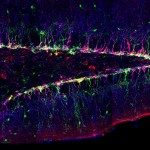Lien vers Pubmed [PMID] – 16598258
Nature 2006 Apr;440(7085):798-802
The internal organs of animals often have left-right asymmetry. Although the formation of the anterior-posterior and dorsal-ventral axes in Drosophila is well understood, left-right asymmetry has not been extensively studied. Here we find that the handedness of the embryonic gut and the adult gut and testes is reversed (not randomized) in viable and fertile homozygous Myo31DF mutants. Myo31DF encodes an unconventional myosin, Drosophila MyoIA (also referred to as MyoID in mammals; refs 3, 4), and is the first actin-based motor protein to be implicated in left-right patterning. We find that Myo31DF is required in the hindgut epithelium for normal embryonic handedness. Disruption of actin filaments in the hindgut epithelium randomizes the handedness of the embryonic gut, suggesting that Myo31DF function requires the actin cytoskeleton. Consistent with this, we find that Myo31DF colocalizes with the cytoskeleton. Overexpression of Myo61F, another myosin I (ref. 4), reverses the handedness of the embryonic gut, and its knockdown also causes a left-right patterning defect. These two unconventional myosin I proteins may have antagonistic functions in left-right patterning. We suggest that the actin cytoskeleton and myosin I proteins may be crucial for generating left-right asymmetry in invertebrates.

